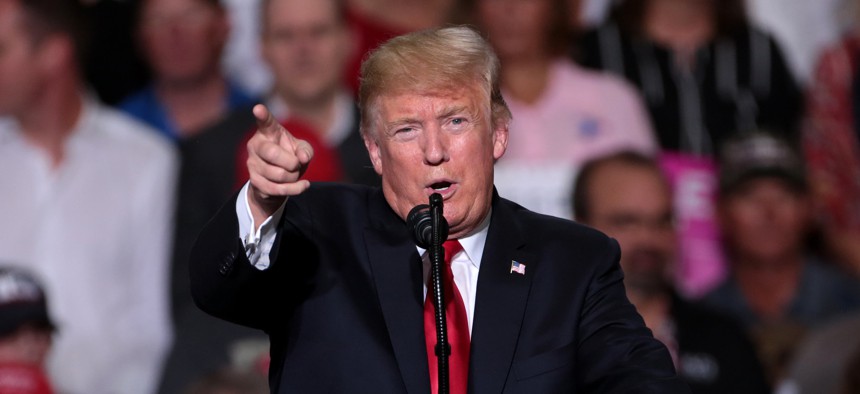
Flickr user Gage Skidmore
Whatever Happens in the Election, Get Ready for a Rocky Transition
President Trump indicates he won’t cooperate with handing over power if he loses to Joe Biden, and if he wins, will root out government officials deemed disloyal to him.
As many of the people who work in government are aware, preparations for a presidential transition have been underway for almost a year. Representatives of the Trump administration and the Biden campaign have worked to craft plans for a potential transfer of power, established agency transition councils and identified acting officials for key jobs.
But at the same time, President Trump has indicated he may not only refuse to accept the results of the election, but not cooperate with a transition if one occurs. And even if he wins a second term, Trump has indicated that major, disruptive change in the federal bureaucracy is coming.
Asked in September if he would commit to a peaceful transfer to a new administration, Trump said, “We’re going to have to see what happens. You know that I’ve been complaining very strongly about the [mail-in] ballots, and the ballots are a disaster.” A few days later he declared that he wanted a “smooth, beautiful transition,” then added, “but it’s got to be an honest vote.” Such a vote, he had already indicated, would be defined as one that resulted in a Trump victory, triggering not a transition, but a “continuation” of his administration.
Then, as the campaign drew to a close, Trump all but announced he would not cooperate with a Biden transition. “They ask me, ‘If you lose, will there be a friendly transition?’ Well, when I won, did they give me a friendly transition?” Trump said at a rally in Ohio. “They spied on my campaign. They did all this stuff. That was not a friendly transition.”
That statement, coupled with an apparent administration plan to declare premature victory on election night, does not bode well for the post-election period in government. Indeed, should Biden ultimately be declared the winner, federal employees may need to prepare themselves for a mirror image of the Trump transition in 2016.
During the 2016 campaign, former New Jersey Gov. Chris Christie was named to head the Trump transition. He went through months of planning and preparation. Then, after the election, he was unceremoniously fired from his position and the plans he developed were literally thrown into the trash. What followed was a chaotic effort to staff the new administration and take over leadership of federal agencies.
If Trump wins reelection, there may be a different kind of chaos, revolving around an effort to identify federal officials deemed insufficiently loyal to the president and replace them with people who have demonstrated their full support for him.
Trump has already moved to create a new employment category, Schedule F, to make it easier to remove career civil servants and replace them with administration loyalists. Agencies have been ordered to identify potentially thousands of employees who could be shifted to the new category.
That presumably, would make it easier for the president to rid himself of people like Dr. Anthony Fauci, whom Trump has increasingly treated with scorn and ridicule. (The problem is that even in situations where federal employees have more limited civil service protections, it’s problematic to announce in advance that you’re waiting until after an election to terminate one of them merely for being insufficiently dedicated to downplaying a pandemic.)
Fauci’s situation epitomizes a significant shift in defining “the swamp” that Trump pledged to drain in his first campaign. Whereas the term was once used to refer to lobbyists and influence peddlers in Washington, the Trump team now applies it almost exclusively to the career bureaucracy. It has become synonymous with the “deep state.”
When Fauci took issue with Trump’s statements that the United States had “rounded the corner” in the coronavirus battle and offered mild praise for Joe Biden’s stance on the pandemic, the words used by the White House to respond were telling. Fauci was “choosing to criticize the president in the media and make his political leanings known by praising the president’s opponent—exactly what the American people have come to expect from The Swamp,” spokesman Judd Deere told the Washington Post.
Fauci is in the glare of the spotlight in a national crisis that has become increasingly politicized. But federal employees in less prominent positions should not kid themselves. To an administration that may be in charge for another four years, they are at best viewed as a bothersome impediment to action on the president’s goals. At worst, they are the enemy.







